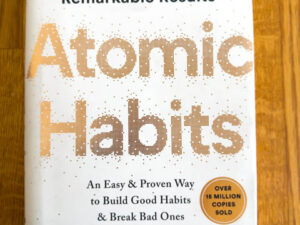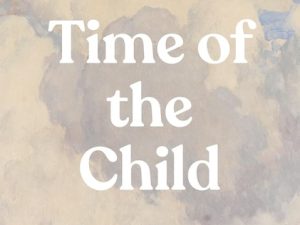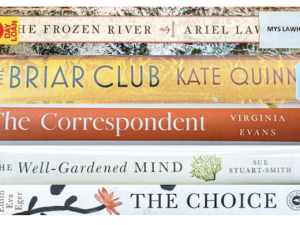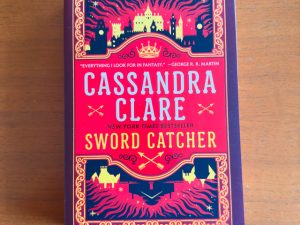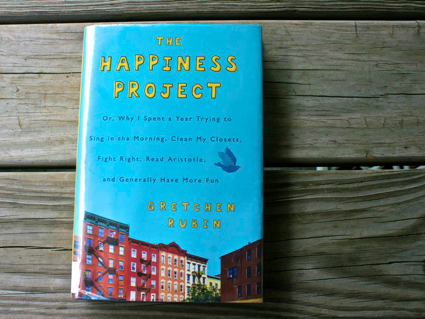
I really enjoyed this book whose premise is that happiness can be cultivated. I give it five stars. Although slow going at times, I found it a thoroughly worthwhile read about one woman’s journey toward figuring out how to make choices that would garner more happiness. She ends up nagging less, de-cluttering more, laughing more, eating junk food less, acknowledging people’s feelings more, and quitting drinking. She learned to give herself permission to be who she was. (That may sound silly but it is actually huge!) But there is so much more than that here. You can get a sense of what this book offers in the bits below. The blue text is the author’s words, the purple is my summary, and the green text is her quoting someone else:
• Read positive psychology authors: Martin Seligman, Daniel Kahneman, Daniel Gilbert, Barry Schwartz, Ed Diener, Milhaly Csikszentmihalyi, and Sonia Lyubomirsky.
• Read novels A Landing on the Sun by Michael Frayn, Bel Canto by Ann Patchett, Wise Blood by Flannery O’Conner, Fight Club by Chuck Palahniuk, and Saturday by Ian McEwan.
• “I designed my own version of [Ben Franklin’s] scoring chart – a kind of calendar on which I could record all my resolutions and give myself a daily check (good) or X (bad) for each resolution.”
• “I wanted to focus on a different subject each month, and twelve months in the year gave me twelve slots to fill. Research had taught me that the most important element to happiness is social bonds, so I resolved to tackle ‘marriage,’ ‘parenthood,’ and ‘friends.’ I’d also learned that my happiness depended a great deal on my perspective, so I added ‘eternity,’ and ‘attitude,’ to my list. Work was crucial to my happiness, and also leisure, so I included the topics ‘work,’ ‘play, and “passion.’ What else did I want to cover? ‘Energy’ seemed like a basic ingredient for the success of the entire project. ‘Money’ was a subject I knew I wanted to address. To explore some of the insights I’d come across in my research I added ‘mindfulness.’ December would be a month in which I would try to follow all my resolutions perfectly…”
• What are some of your “Commandments?” Here are some of the author’s: “Act the way I want to feel.” “Do what ought to be done.” “Enjoy the process.”
• What are some of your “Secrets of Adulthood?” Here are some of the author’s: “People don’t notice your mistakes as much as you think.” “It is important to be nice to everyone.” “By doing a little bit each day, you can get a lot accomplished.” “If you’re not failing, you’re not trying hard enough.”
• “Happiness is the meaning and purpose of life, the whole aim and end of human existence.” Aristotle
• “We must exercise ourselves in the things which bring happiness, since, if that be present, we have everything. and, if that be absent, all our actions are directed toward attaining it.”
• “The time to start exercising, stop nagging, and organize our digital photos was when everything was going smoothly. I didn’t want to wait for a crisis to remake my life.”
• “Another study suggested that getting one extra hour of sleep each night would do more for a person’s daily happiness than getting a $60,000 raise.”
• Read the Unclutterer Blog .
• “…my mother made me feel that nothing was insurmountable if I did what I knew I ought to be done, little by little.”
• “‘Try a virtual move,’” another friend added. ‘I just did it myself. Walk around your apartment and ask yourself – if I were moving would I pack this or get rid of it?’”
• “I’d realized that often I put up with a problem for years because I never examined the nature of the problem and how it might be solved.”
• “I started to apply the ‘one-minute rule’; I didn’t postpone any task that could be done in less than a minute.”
• “…studies show that one of the best ways to lift your mood is to engineer an easy success, such as tackling a long delayed chore. I was astounded by the dramatic boost in my mental energy that came from taking care of these neglected tasks.”
• see “sweet, sentimental” movies… “favorite is Say Anything.”
• “I remember talking to a friend whose parents had been very involved in the civil rights movement. ‘They always said,’ he told me, ‘that you have to do that kind of work for yourself. If you do it for other people, you end up wanting them to acknowledge it and to be grateful and to give you credit. If you do it for yourself, you don’t expect other people to react in a particular way.’”
• “Couples who fight right tackle only one difficult topic at a time, instead of indulging in arguments that cover every grievance since the first date.”
• “Whatever love I might feel in my heart, others will see only my actions.”
• “You manage what you measure.” Business school truism
• “Happiness is neither virtue nor pleasure nor doing this thing nor that but simply growth. We are happy when we are growing.” William Butler Yeats
• “Enthusiasm is more important to mastery than innate ability, it turns out, because the single most important element in developing an expertise is your willingness to practice.”
• “The chief happiness for a man is to be what he is.” Erasmus
• starting the Happiness Project Blog incorporated “novelty and challenge” into her happiness project, as has mine!
• “When you send an email to alert someone to a post you’ve made, include the entire text of your post, not just a link.” Do you want me to follow that advice?
• “A small daily task, if it be really daily, will beat the labours of a spasmodic Hercules.” Anthony Trollope
• “Ah, but a man’s reach should exceed his grasp, or what’s a heaven for?” Robert Browning
• “Show me a contented man, and I’ll show you a failure.” Andrew Carnegie
• “The most important lesson from Fabor and Mazlish’s books is simple and as applicable to adults as it is children: we should acknowledge the reality of people’s feelings. In other words, don’t deny feelings such as anger, irritation, fear, or reluctance; instead, articulate the feeling and the other persons point of view.”
• “Studies show that 85% of adult messages to children are negative –’no,’ ‘stop,’ ‘don’t’ – so it’s worth trying to keep that to a minimum. Instead of saying, ‘No, not until after lunch,’ I try o say, ‘Yes, as soon as we’ve finished lunch.’
• “Studies say that people persevere longer with problems they’ve been told are difficult as opposed to easy.”
• “Experts say that denying bad feelings intensifies them; acknowledging bad feelings allows good feelings to return.”
• “Studies show that recalling happy times helps boost happiness in the moment.”
• “To eke out the most happiness from an experience, we must anticipate it, savor it as it unfolds, express happiness, and recall a happy memory.”
• “If something was really fun for me, it would pass this test: I looked forward to it; I found it energizing, not draining; and I didn’t feel guilty about it later.”
• Put miscellaneous objects you keep for sentimental reasons in a “Happiness Box.”
• “Either once only, or everyday. If you do something once it is exciting, and if you do it every day it’s exciting. But if you do it, say twice or almost every day, it’s not good anymore.” Andy Warhol
• “Everyone from contemporary scientists to ancient philosophers agree that having strong social bonds is probably the most meaningful contributor to happiness.”
• “Of all the things that wisdom provides for living one’s entire life in happiness, the greatest joy by far is friendship.” Epicurus
• “One of the best ways to make yourself happy is to make other people happy. One of the best ways to make other people happy is to be happy yourself.”
• “Studies show that…people unintentionally transfer to me the traits I ascribe to other people.”
• “What would I do if I weren’t scared?”
• “If you can’t get out of it, get into it.”
• “Studies show that people’s basic psychological needs include the need to feel secure, to feel good at what they do, to be loved, to feel connected to others, and to have a strong sense of control. Money doesn’t automatically fulfill these requirements…”
• “One intriguing study showed that… people who give money to charity end up wealthier than those who don’t give to charity.”
• “Studies show that spiritual people are relatively happier; they’re more mentally and physically healthy, deal better with stress, have better marriages, and live longer.”
• “Knowing what you admire in others is a wonderful mirror into your deepest, as yet unborn, self.”
• Read Saint Therese of Lisieux’s spiritual memoir, Story of a Soul.
• “It is more selfless to act happy. It takes energy, generosity, and discipline to be unfailingly lighthearted, yet everyone takes the happy person for granted.”
• “When researchers tried to figure out what helped third and fourth graders remember what they read, they found that the students’ interest in a passage was far more important than the ‘readability’ of the passage – thirty times more important.”
• Slightly Foxed is “a charming British quarterly that publishes people’s essays about their favorite books…”
• check out lulu.com for self publishing personal books…
• “The least strained and most natural ways of the soul are the most beautiful; the best occupations are the least forced.” Michel de Montaigne
• “…if you’re willing to take the blame, people will give you responsibility.”
• “A small child laughs more than four hundred times each day, and an adult – seventeen times.”
• “Enthusiasm is a form of social courage.”
• “My own game, ‘Pollyanna Week,’ would be a solid week of no negative comments.”
• “Being asleep is a great way to avoid being critical.”
• “One fact of human nature is that people have a ‘negativity bias’: we react to the bad more strongly and persistently than to the comparable good. As I’d learned in February, within a marriage, it takes at least five good acts to repair the damage of one critical or destructive act.”
• “…novelty and challenge, in fact… are a key source of happiness.”
• “There is no duty we so much underrate as the duty of being happy.” Robert Louis Stevenson
• “The single most effective step for me had been to keep my Resolutions Chart.”
• “…the more I kept my resolutions, the happier I was.”
• Resolutions are different than goals. Goals you complete, whereas resolutions are ongoing, with every day a “clean slate and a fresh opportunity” to succeed.
• “To help other people do a happiness project, I created the Happiness Project Toolbox to pull together on one site all the tools that I found most helpful for my happiness project.”
• Check it out!

